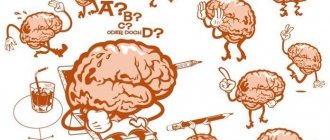Absent-mindedness is a special state of attention, revealed in the inability of an individual to concentrate on what is happening and being done. This term can also refer to lack of composure, negligence and forgetfulness. However, it is wrong to consider impaired concentration as a vice; it is rather just a property of nature. In addition, such a condition may indicate the occurrence of certain pathologies. There are two variations of absent-mindedness: imaginary and true (genuine). The first occurs when a person is carried away by an activity, fixated on a certain task, when he is so absorbed in the process that he becomes inattentive to what is happening. The second is characterized by the difficulty of maintaining voluntary attention on any object or action.
What is absent-mindedness and inattention?
Absent-mindedness and inattention are the inability to concentrate on any object or action. These character traits cause a lot of problems for absent-minded and forgetful people who have them. They themselves suffer because they forget about important promises and meetings, and their loved ones and friends suffer. It happens that for this reason they are even fired from their jobs.
These people try to concentrate, promise themselves to be attentive, but nothing works out for them. They make a list of things that they take with them on a trip, write down the things they need to do, but as a result they forget where they put the notebook with notes...
And then they begin to think: maybe this is not a character trait, but a psychological deviation? Or maybe one of the symptoms of some disease? Perhaps the situation can be corrected by taking medications, vitamins or adjusting your diet?
However, forgetfulness, absent-mindedness and inattention are so common that even the term “attention deficit disorder” has appeared. To some extent, all people are forgetful, because, probably, each of us at least once in our lives had to forget something purchased and paid for in a store. A left-on iron or a forgotten and burnt kettle or pan are generally classic examples of absent-mindedness.
Diagnostics
To find out how to deal with absent-mindedness in your case, you need to visit an endocrinologist for a detailed medical history and obtain prescriptions for laboratory diagnostics. Research at the stage of visiting an endocrinologist includes tests, ultrasound diagnostics, and identification of predisposition to hereditary diseases. If a patient has chronic illnesses, he regularly faces stress, sleeps poorly, and absent-mindedness is not surprising. Sometimes additional studies may be required: ECG, encephalogram, etc.
Psychologists identify three types of inattention
"Fluttering" attention
This is a weak concentration of attention, which is characterized by slight involuntary switching. Such inattention is typical, for example, of preschoolers. It occurs when tired, after a sleepless night, during a headache or during monotonous monotonous work. A type of such absent-mindedness is road hypnosis, when a person falls into a state of half-asleep that occurs during a long trip on a calm road.
"Professor's" absent-mindedness
With the second type of inattention, there is a high concentration of attention with difficulty switching, which is characteristic, for example, of scientists focused on their thoughts - the so-called “professorial” absent-mindedness. Many great people were absent-minded because they were focused on their creativity.
For example, N. Zhukovsky, who is called the father of Russian aviation, once received guests in his own living room. A few hours later he got up, put on his hat and began to say goodbye, apologizing that he had stayed too long visiting and it was time to go home.
And the English mathematician and physicist Isaac Newton once decided to boil an egg and put a watch in the water instead. There were also such oddities: the astronomer Galileo did not recognize his wife in his marital bed, because he forgot that he was married. And the historian Mommsen, looking for his glasses, thanked the girl who gave them to him and asked her name. “Anna, your daughter, dad,” the girl answered.
The same type of inattention is found in people who are haunted by obsessive thoughts, or in people who are too absorbed in the implementation of an overvalued idea - a fixed idea.
Poor concentration
And the third type of inattention is a weak concentration of attention with even weaker switchability. It is typical for people who have reduced strength and mobility of nervous processes. Usually in this case they talk about senile absent-mindedness. In healthy people, these processes decrease when overworked.
It is curious that psychologists, studying absent-mindedness and forgetfulness, observed a group of people during an experiment and noticed that in men these properties “exacerbated” in the period from 8 to 10 o’clock in the morning, and in women from 10 to 12 o’clock. And regardless of gender, the peak of errors was observed from 4 to 6 pm and from 8 to 10 pm.
Life hacks to improve concentration
Even when you are truly passionate about the process and know how to stay focused on your goals, daily practice can create chaos and harm your mindfulness. Here are some additional ways to improve your concentration.
Select an anchor task
Choose one (and only one) priority for each workday. Although I plan to complete other tasks throughout the day, my priority is one non-negotiable task that I must finish. I call it the "anchor task."
With a single priority, we don't hesitate to start building our lives around that commitment.
Manage your energy, not your time
If a task requires your full attention, schedule it for a specific time of day when you have the energy for it. For example, I noticed that my creative energy is highest in the morning. I feel more alert in the morning, write better, and make better strategic decisions for my business. That's why I plan all my creative tasks for the morning. And I push all other work matters to the second half of the day: meetings, answering incoming messages, phone calls and Skype chats, analysis and processing of numerical information.
Almost every productivity strategy includes advice to better manage your time. But time itself is useless if you don't have the energy to complete the task.
Never check email in the morning
Concentration is the elimination of all distractions. And email can be your biggest distraction.
If I don't check email at the beginning of the day, I can create my own routine rather than having to adapt to someone else's routine.
I understand that for many people there is no point in waiting until the afternoon, but I want to challenge you. Can you wait until 10 am? Or until 9? Until 8:30? The exact time of the restriction is not that important. The point is that you can carve out time in the morning where you can focus on what matters most to you.
Leave your phone in another room
I usually put my phone away in the morning. It is much easier to get into the mood for work if SMS, phone calls or notifications do not distract your attention.
Work in full screen mode
Every time I run a program on my computer, I use it in full screen mode. If I read an article on the Internet, the browser takes up the entire screen. If I'm writing notes in Evernote, I use full screen mode. If I'm editing images in Photoshop, the program window is the only thing I can see. I configured the desktop so that the menu bar would automatically disappear. When I'm working, I can't see the time, application icons, or all the other distracting things.
It seems like a small thing, but in terms of concentration, this is a very important action. If you see an app icon, you'll be tempted to click it from time to time. However, if you remove the visual signal from your field of vision, then the desire to be distracted disappears after a few minutes.
Causes of absent-mindedness
To get rid of absent-mindedness, you need to know its causes. The main thing is that this is not an innate character trait, but an acquired one.
There is an opinion that absent-mindedness can occur:
- on a subconscious level - with reluctance to do what you need to focus on;
- for overwork , headache, fatigue, etc.;
- while performing automatic actions in a familiar environment when attention is suddenly distracted by external or internal factors. For example, a woman is peeling potatoes when her friend calls her and tells her an exciting story. It would not be surprising if, having listened, she automatically throws the potatoes into the trash can and the peelings into the pan. Or another story: the cashier working at the cash register is mentally worried about the upcoming divorce. Naturally, errors in her work are inevitable;
- when trying to do several things at once . People say about an absent-minded person that he counts crows. That is, his attention is diverted from his main occupation by extraneous matters;
- with organic brain lesions ;
- for certain mental illnesses (depression, anxiety disorders).
Often people suffering from absent-mindedness and forgetfulness blame their memory, but it has nothing to do with it.
Properties of attention
1. Concentration (focus) is maintaining attention on one object or one activity while distracting from everything else. Concentration of attention depends on age and work experience (increases slightly over the years), as well as on the state of the nervous system (with low neuropsychic tension it increases slightly, and with high stress it decreases). Typically, concentration is associated with deep interest in an activity, an event, or a fact. An indicator of its intensity
is the inability to distract attention from the subject of activity by extraneous stimuli.
For example,
a child is assembling a new construction set. He is completely absorbed in his work, is not distracted for a minute, does not notice how time passes, does not respond to phone calls, you can call him, call him to dinner - he does not answer, and sometimes he does not even hear.
2. Stability – duration of concentration on an object or phenomenon.
The opposite of stable attention is unstable, fluctuating,
which every now and then is weakened or diverted to the side. With a stationary, unchanging object - 5 seconds, with active action with an object - 15 seconds. It has now been proven that the most essential condition for the stability of attention is the ability to reveal new aspects and connections in the subject on which it is focused (therefore, experimental, search activity is necessary), and is also associated with overcoming difficulties associated with positive emotions.
Stability depends on the following reasons:
§ individual physiological characteristics of a person, in particular the properties of his nervous system (for example, people with a weak nervous system or overexcited people can get tired quite quickly, become impulsive, attention fluctuates; if they feel unwell, the same thing);
§ mental state (excitability, lethargy, etc.);
§ correlation with motives (the presence or absence of interest in the subject of activity, its significance for the individual);
§ external circumstances of the activity (absence of external distractions).
3. The volume of attention is the amount of information (objects) that are perceived simultaneously with sufficient clarity, i.e. are captured by attention at once.
The numerical characteristic of the average attention span of people 5 +/- 2. largely depends on the knowledge of objects (a person’s experience) and their connections with each other (unification of objects by meaning, groupings, their location).
Attention span is important to consider in many areas of life. For example, in order to pay attention to a billboard and remember it, it is necessary that the advertisement contain no more than 5 words, and if there are more, then the most important words should be highlighted more clearly, but they should not exceed 4-6.
4. Distribution of attention is the ability to perform two or more different activities while maintaining your attention on them.
To successfully perform two jobs at the same time, at least one of them must be well known, so that it is performed automatically, and the person only consciously controls and regulates it from time to time. In this case, the main focus is on the second job (for example, air traffic controller, operator; the driver can simultaneously perform 42 operations: monitor the road, assess the traffic situation, change gears, etc. Historians claim that Gaius Julius Caesar and Napoleon could perform several at once case. In 1887, the French psychologist Paulan demonstrated his abilities: he read one poem to listeners and at the same time wrote another. He simultaneously recited poems and performed complex multiplications in writing. The teacher must also have a well-developed distribution of attention: simultaneously see all the children and each child individually, explain (play), draw and make sure that no one is distracted.
However, it is difficult to combine two types of mental activity.
5. Switching attention is a deliberate transfer of attention from one object to another in connection with the formulation of a new task.
Mindfulness
distinguishes switching from distraction. When distracted, a person changes the object involuntarily; switching - sets the goal to do something else or relax.
Switching depends on:
§ on the nature of the object (for example, they were writing a test - at the beginning of the next lesson it is difficult to switch from the work just done);
§ from the habit of switching attention (for example, in some groups the bell rings, the teacher enters, there is a complete switch to the lesson; if you have learned not to concentrate on the lesson for a long time, then the switch occurs slowly);
§ interest in the subject and awareness of its significance for a person (switching occurs faster);
§ individual characteristics of a person, the mobility of his nervous system (switchability is higher in young people). In a state of neuropsychic stress, this indicator decreases due to increased stability and concentration.
The various properties of attention are largely independent of each other. Thus, high concentration can be combined with weak switchability.
Distraction of attention and its types. Absent-mindedness is a person’s inability to concentrate on anything specific for a long time. There are two types of absent-mindedness: imaginary and genuine.
Two main types of absent-mindedness can be distinguished . The first is the result of a general instability of attention. They are usually distinguished by younger children. However, it can also occur in adults as a result of weakness of the nervous system or extreme fatigue, lack of sleep, etc. This type of absent-mindedness also appears in the absence of the habit of working with concentration.
Genuine absent-mindedness. A person suffering from this type of absent-mindedness has difficulty establishing and maintaining voluntary attention on any object or action. To do this, he requires significantly more volitional efforts than a person who is not absent-minded. The voluntary attention of an absent-minded person is unstable and easily distracted. Physiologically, genuine absent-mindedness is explained by insufficient strength of internal inhibition. Excitation arising under the influence of speech signals is easily radiated, but is difficult to concentrate.
The causes of genuine absent-mindedness are varied; knowledge of them is necessary in order not to strengthen absent-mindedness, but to fight it. The cause of true absent-mindedness may be a general disorder of the nervous system (neurasthenia), anemia, diseases of the nasopharynx, which impede ventilation of the lungs and, therefore, deplete the oxygen supply of brain cells. Sometimes absent-mindedness appears as a result of physical and mental fatigue and overwork, difficult experiences. One of the reasons for true absent-mindedness is the overload of the brain with a large number of impressions. Scattered interests can also lead to genuine absent-mindedness; disordered hobbies strengthens absent-mindedness. Another reason for genuine absent-mindedness can be the improper upbringing of a child in the family: the lack of a regime in the child’s activities, entertainment and recreation, fulfillment of all his whims, exemption from work duties. Boring teaching, which does not awaken thoughts, does not touch feelings, and does not require effort of will, is one of the sources of student distraction.
The second type of absent-mindedness has a completely different character. It occurs because a person is focused on one thing and therefore does not notice anything else. People who are passionate about their work are characterized by such absent-mindedness.
Imaginary absent -mindedness is a person’s inattention to the immediately surrounding objects and phenomena, caused by the extreme concentration of his attention on any object. Imaginary absent-mindedness is the result of great concentration and narrowness of attention. Sometimes it is called “professorial”, since it is often found among people of this category. A scientist’s attention can be so concentrated on the problem that occupies him that he does not hear questions addressed to him, does not recognize acquaintances, and answers inappropriately. The physiological basis of imaginary absent-mindedness is a powerful focus of optimal excitation in the cerebral cortex, causing inhibition in the surrounding areas according to the law of negative induction. The ambiguity of the reflection of various kinds of external influences during distracted attention is explained by the fact that it occurs in areas of the cerebral cortex that are in a state of inhibition.
Absent-mindedness as a consequence of internal concentration does not cause much harm to the cause, although it makes it difficult for a person to orient himself in the world around him.
How to easily get rid of absent-mindedness
Absent-mindedness is not such a harmless character trait, so psychologists study its causes. After all, the inattention of people who service, for example, dangerous equipment can cause a catastrophe or man-made accident.
Absent-mindedness is treated or corrected depending on the cause of its occurrence. For depression or anxiety, the psychotherapist selects antidepressants. If it is caused by overwork, then rest, a change of environment, etc. will solve the problem.
5 steps
If absent-mindedness becomes chronic and firmly established in our lives, we can analyze our lifestyle and take the following steps:
- Determine priorities and concentrate your attention on completing one task or only one object. Most people do not know how to do two or three things well at the same time. For example, a group of participants in a psychological experiment were asked to observe athletes at a volleyball match and count the number of balls thrown into the basket by team members wearing blue T-shirts. During the match, a man dressed in a gorilla suit walked across the field, but no one noticed him, since everyone was busy watching the players and counting the goals scored. After watching the game again, the experiment participants were very surprised that they had not noticed such an obvious fact;
- While working remove all objects that distract attention and create chaos. Extra items on the desktop - books, magazines that are not relevant to the task, photographs that lead to thoughts of relaxation; for those who have problems concentrating, it is better to put them away;
- Use visual cues . Of course, you can keep a diary where you can write down upcoming tasks. Additionally, you can use some item that will remind you of an important matter in the morning. For example, in the evening, put a regular sheet of paper or a book on the floor in the middle of the room. One look at them in the morning and we will remember that we need to make an urgent call. This method is reminiscent of grandma’s “memory knot.” Our grandmothers tied such knots on handkerchiefs so as not to forget to do something important;
- Pause to collect your thoughts and fix your attention on the current moment. For example, when leaving the apartment, we should not think about whether we are on time for the bus, but focus on thoughts about its safety: check electrical appliances, gas, water, etc.;
- Solve all problems as they arise, without delaying until later. A pile of unfinished tasks also leads to chaos in thoughts and absent-mindedness.
© Elena Timoshenko, BBF.RU
Let's look at typical examples
Olya, 7 years old. The girl does well at school. But when she returns home from school, she cries for a long time for no apparent reason. In class, Olya reacts to everything she doesn’t like with tears, and this pushes her classmates away. The girl is worried, but cannot control herself.
Olya's mother brought with her the results of her school drawing test. When the girl imitated the phrase “hard work,” she drew a picture of a school building. The school psychologist absolutely correctly determined that the girl was experiencing severe overload.
But we cannot individually select a curriculum for each student. What should I do?
Artem, 8 years old. Mom's complaints about lack of interest in studying, numerous mistakes in writing, unsatisfactory grades, excitability, conflict, unsatisfactory behavior at school.
Artem does not sit quietly in class; his diligent behavior lasts for about 10 minutes. The grades in his diary are varied - from two to four. He teaches lessons for about five hours, constantly being distracted by any little things. Although sometimes, if there is something interesting ahead, the boy can complete assignments in all subjects quickly and well. “He’s smart, but he’s lazy,” says the teacher.
He doesn’t have a good time with his friends in class, because he often completely unconsciously commits actions that are accepted by children as intentionally harmful. His behavior becomes uncontrollable, and outwardly it looks like foolishness.
How to improve Artyom’s school life?
Julia, 11 years old. Parents' complaints about absolute illiteracy, absent-mindedness, “stupid” mistakes in notebooks, lack of interest in learning. Despite these shortcomings, the girl is very smart, talks like an adult on any topic, and adequately evaluates herself. I have an excerpt from her essay on a free topic: “Once upon a time there was a Button, there were four sisters on one shirt, and when it came off, for some reason they sewed it back with black thread. She was offended and decided to break away forever. She turned around, twirled on her thin leg, the thread frayed, the button fell and was lost... First, she rolled into a dark crevice and floor and was afraid that she would never get out, and then, when she succeeded, she wiped away her tears and went to travel around the world..." . The following describes Button's adventures in a water hatch, on a fireman's jacket, and so on. Teacher's rating: “5” for content and “2” for literacy, which is quite fair: there are countless mistakes in it...
Where does a smart girl make such mistakes? What to do with Yulia?
What is attention from a psychological point of view?
Attention is a concept in cognitive psychology that represents the extent to which we process specific information that our brain receives from the environment.
Thanks to attentiveness, the subject’s successful orientation in the surrounding space is ensured, and it also ensures a complete and clear reflection in the psyche. The object of attention falls into the center of our consciousness, other elements are perceived weakly, not clearly, but at the same time the direction of our attention can change.
There are several types of attention:
- Involuntary type . While working with this type of attention, a person does not make any effort of will to concentrate, he does not even set a goal for himself.
- Arbitrary type . During this type, a person makes an effort of will to focus on a specific object.
- Postarbitrary type . During this type of attention, a decrease in volitional efforts is characteristic, but the goal of being attentive remains.
4.Sedentary lifestyle.
Lack of physical labor and a sedentary lifestyle are one of the reasons for inattention. In the office you sit on a chair all day, come home, eat - and go to the sofa. This lifestyle, without physical “shake-up”, worsens blood circulation. The brain receives less oxygen, which directly affects its performance, worsening the quality of attention and other cognitive functions.
Make it a habit, for example, to do exercises: it is undeservedly crowded out of our lives. You can find many health-improving techniques and systems on the Internet. There would be a desire!
Lack of sleep
The sleep norm for a person aged 20 to 60 is from 7 to 9 hours a day. If you sleep less, you can develop chronic irritability, weakness, headaches and poor concentration. It’s clear that all this significantly reduces your performance and overall alertness.
What to do. The answer is simple - get enough sleep. Your condition should return to normal.
When to see a doctor. If you sleep more than 8 hours a day and still experience symptoms of sleep deprivation. The reasons can be different: from a basic violation of sleep hygiene to a serious sleep disorder.
Technogenic overload
The latest technologies not only make our lives more convenient, but also completely capture our attention. Up to a certain point, your brain can, like a good secretary, sort everything into shelves and structure its tasks. But the more things you do at once, the more difficult it is to concentrate on each one individually.
Imagine: you are working on an official report, at the same time you are communicating on ICQ, receiving SMS, and even trying to adjust the intensity of the air conditioner. Not surprisingly, the more buttons you press, the faster you forget what you were doing.
What to do. The simplest way out is to keep a diary, writing down everything you need to do today. Also try to arrange days of rest from the Internet and cell phone. You will see that when all these “devices” are turned off, you will complete your work much faster.
When to see a doctor. If, having taken a break from work to send an SMS, you cannot return to work for a long time and are looking for new reasons not to do it.








